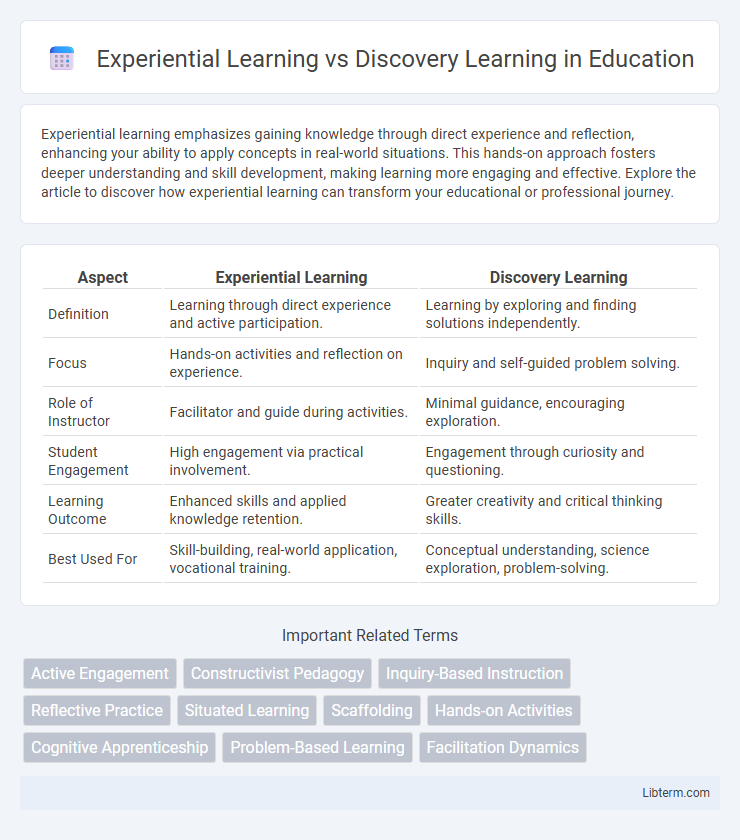Experiential learning emphasizes gaining knowledge through direct experience and reflection, enhancing your ability to apply concepts in real-world situations. This hands-on approach fosters deeper understanding and skill development, making learning more engaging and effective. Explore the article to discover how experiential learning can transform your educational or professional journey.
Table of Comparison
| Aspect | Experiential Learning | Discovery Learning |
|---|---|---|
| Definition | Learning through direct experience and active participation. | Learning by exploring and finding solutions independently. |
| Focus | Hands-on activities and reflection on experience. | Inquiry and self-guided problem solving. |
| Role of Instructor | Facilitator and guide during activities. | Minimal guidance, encouraging exploration. |
| Student Engagement | High engagement via practical involvement. | Engagement through curiosity and questioning. |
| Learning Outcome | Enhanced skills and applied knowledge retention. | Greater creativity and critical thinking skills. |
| Best Used For | Skill-building, real-world application, vocational training. | Conceptual understanding, science exploration, problem-solving. |
Introduction to Experiential and Discovery Learning
Experiential Learning involves acquiring knowledge through direct experience and reflective observation, emphasizing active engagement in real-world tasks. Discovery Learning centers on exploring and problem-solving to foster understanding without explicit instruction, encouraging learners to investigate and construct knowledge independently. Both methods promote deep cognitive processing but differ in structure, with Experiential Learning providing guided experiences and Discovery Learning offering more open-ended inquiry.
Defining Experiential Learning
Experiential learning is a process where learners gain knowledge and skills through direct experience and reflection, emphasizing active participation rather than passive absorption. It is defined by its cycle of concrete experience, reflective observation, abstract conceptualization, and active experimentation, facilitating deeper understanding and practical application. This method contrasts with discovery learning, which encourages learners to explore and find solutions independently without guided reflection.
Defining Discovery Learning
Discovery learning is a student-centered approach where learners actively explore and investigate concepts to construct knowledge autonomously. It emphasizes critical thinking and problem-solving by allowing students to uncover patterns and principles through hands-on experimentation without direct instruction. This contrasts with experiential learning, which involves learning through reflection on doing but often includes structured guidance and feedback.
Core Differences Between Experiential and Discovery Learning
Experiential learning emphasizes hands-on experiences and reflection to solidify understanding, involving active participation in real-world tasks. Discovery learning centers on self-guided exploration and inquiry, allowing learners to uncover knowledge independently through problem-solving. The core difference lies in experiential learning's structured, reflective process contrasted with discovery learning's open-ended, learner-driven investigation.
Key Principles of Experiential Learning
Experiential learning centers on active participation and reflection, emphasizing concrete experiences as the foundation for acquiring knowledge and skills. Key principles include learning through direct engagement, critical reflection on actions, and applying insights to real-world situations. This approach contrasts with discovery learning by providing structured guidance, promoting deeper understanding through iterative cycles of experience and evaluation.
Key Principles of Discovery Learning
Discovery learning emphasizes active student involvement through exploration and problem-solving without direct instruction, fostering intrinsic motivation and deeper understanding. Key principles include learner autonomy, where students construct knowledge by interacting with materials or scenarios, and scaffolding, enabling guidance tailored to individual needs. This approach encourages critical thinking and adaptability by promoting hypothesis testing, reflection, and strategic experimentation within authentic contexts.
Benefits of Experiential Learning
Experiential learning enhances knowledge retention and skill development by engaging learners directly in real-world tasks, fostering critical thinking and problem-solving abilities. This approach promotes active participation and reflection, which strengthens understanding and adaptability in complex situations. Experiential learning also improves motivation and confidence, leading to deeper cognitive connections compared to passive learning methods.
Benefits of Discovery Learning
Discovery Learning enhances critical thinking by encouraging learners to explore concepts independently, fostering deeper understanding and retention. It promotes creativity and problem-solving skills through active engagement and experimentation. This approach increases motivation and curiosity, leading to a more personalized and meaningful learning experience.
Challenges and Limitations of Each Approach
Experiential learning faces challenges such as resource-intensive setups and potential variability in learner engagement, which can limit consistency and scalability. Discovery learning often struggles with students' cognitive overload and frustration due to minimal guidance, resulting in slower knowledge acquisition and uneven comprehension. Both methods require careful facilitation to balance autonomy and structure for effective educational outcomes.
Choosing the Right Approach for Optimal Learning Outcomes
Experiential learning emphasizes hands-on experience and reflection to deepen understanding, making it ideal for skill development and practical application. Discovery learning promotes exploration and problem-solving, fostering critical thinking and creativity, which suits inquiry-based subjects. Selecting the right approach depends on learning objectives, learner characteristics, and context, ensuring alignment with desired outcomes for optimal engagement and knowledge retention.
Experiential Learning Infographic

 libterm.com
libterm.com